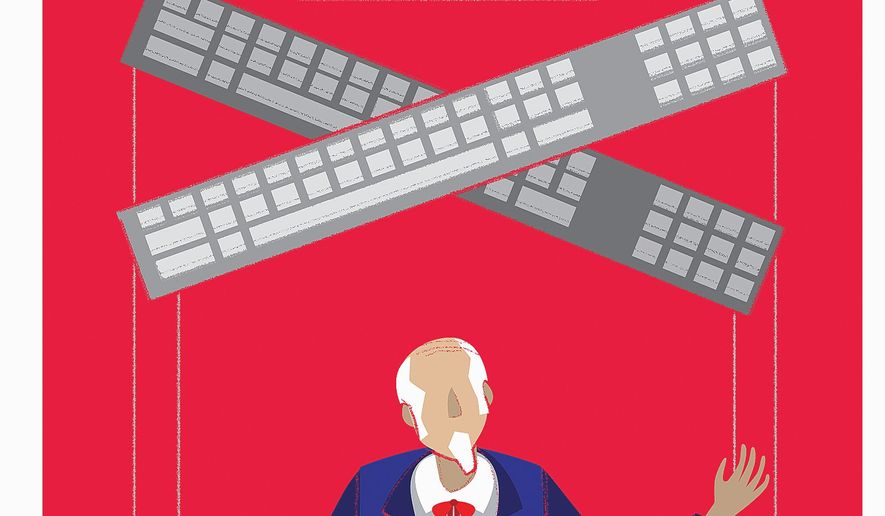OPINION:
Just so there’s no confusion: This column is not about Americans conspiring or colluding or coordinating with Russians. That’s a separate controversy about which I don’t have a lot to say at this moment.
What this column is about: Dezinformatsiya, the Russian word that gave birth, in the 1980s, to the English neologism “disinformation.” Understand that disinformation is not a synonym for misinformation. The later implies information that happens to be wrong. The former implies an attempt to deceive public opinion for strategic purposes.
For decades, thousands of Soviet propagandists and espionage agents disseminated tons of dezinformatsiya around the world. Today, using social media, sophisticated tech platforms and cyber weapons, the Russian government, headed by Vladimir Putin, is running a dezinformatsiya offensive beyond Joseph Stalin’s wildest dreams.
Jamie Fly and Laura Rosenberger have been studying this operation. Senior fellows at The German Marshall Fund of the United States, they are seasoned national security professionals. Both have worked, among other assignments, at the National Security Council, Mr. Fly in the George W. Bush administration, Ms. Rosenberger under President Obama.
They’ve been tracking “Kremlin-oriented social media accounts,” “troll farms,” “fake personas” and “fake organizations.” President Putin, they’ve concluded, is attempting to undermine faith in America’s democratic institutions, assist extremists on both the left and right, divide and polarize Americans (even more than they already are), and poison the policy debates that citizens of a mature republic should be able to conduct in a civil manner.
Elections are just one target of opportunity. Russia’s networks, Mr. Fly and Ms. Rosenberger write in the Journal of Democracy, have been using social media to heighten tension in a range of controversies. One example: Reasonable people may differ over whether Confederate statues, in Charlottesville and elsewhere, should remain or be removed. The mission of Russian disinformation operations: Make this a fight between neo-Nazis on one side and Antifa thugs on the other.
Another example: Mr. Putin has a strong interest in keeping his European neighbors dependent on his oil and gas, and pushing the price of those commodities as high as possible. So Mr. Putin’s networks have been running a covert disinformation campaign against hydraulic fracturing, the technology that has made it possible to access abundant natural gas deposits cheaply. The Kremlin didn’t create the controversy over fracking, it has simply promoted “some of the most divisive, conspiracy-minded stories around” that debate.
America is not Moscow’s only target. The Fly/Rosenberger research “has found examples of Russian interference” in 27 countries since 2004: planting false information in reputable newspapers, boosting radical political parties, hacking moderate political parties and leaking juicy tidbits to friendly and/or credulous journalists. More insidious than spreading fake news is sprinkling lies into a goulash of facts to produce a distorted narrative that becomes impossible to successfully rebut.
Why is Mr. Putin doing this? If that’s the question you’re asking, you haven’t been paying attention to the man. His mission is to restore the power Russia lost when the Soviet Union collapsed. And, in his calculus, strengthening Russia and weakening the West amount to the same thing.
Mr. Putin is an authoritarian and like other authoritarians — Chinese, Iranian, Turkish, North Korean, etc. — he regards democratic and republican forms of government as weak, decadent and, over time, bound to fail or, better yet, be defeated.
Undermining democratic institutions increases Mr. Putin’s legitimacy. You say elections in Russia are rigged? His supporters say that elections are not so free and fair in America and Europe either. This perception hobbles movements in support of civil rights and representative government everywhere.
Okay, I think I will say a few words about the raging partisan debate — allegations from Democrats and some #NeverTrump Republicans that Mr. Putin meddled in America’s 2016 election with the goal of helping Donald Trump. More likely is what retired CIA chief of station and veteran Russia-watcher Daniel Hoffman concluded: that the “Russian espionage disinformation plot” was meant to target “both parties and America’s political process.”
As evidence, he notes a 2017 report from the U.S. Office of the Director of National Intelligence which concludes that “pro-Russia bloggers even prepared an election-night Twitter campaign, #DemocracyRIP, designed to question the election’s validity after a Clinton victory.”
As V.I. Lenin would say: What is to be done? A bipartisan bill introduced by Sen. Marco Rubio and Sen. Chris Van Hollen would punish Moscow if our intelligence community determines that Russia is interfering in future elections.
Mr. Fly and Ms. Rosenberger argue that a “whole-of-government response, with a strong interagency lead and process that cuts across national security and domestic policy spaces, will be required to address this threat.”
They add: “With the United States and Europe facing a shared threat with similar tactics, a united trans-Atlantic response is critical to pushing back on Moscow’s efforts to weaken democracies and divide democratic nations from one another.”
Finally, the United States should do whatever is necessary to win the race in cyberspace, as much a domain of modern warfare as air, land, sea and space. Our aim should be nothing less than overwhelming superiority, both defensively and offensively.
We also need to get way ahead in the race for artificial intelligence, a weapon of dezinformatsia with enormous potential. Mr. Putin declared last year that “whoever becomes the leader in this area will rule the world.”
The United States has no interest in ruling the world. The United States does have a vital interest in preventing authoritarians from ruling the world. Acutely aware of that, Mr. Putin will do everything in his power to keep us at each other’s throats.
• Clifford D. May is president of the Foundation for Defense of Democracies and a columnist for The Washington Times.




Please read our comment policy before commenting.